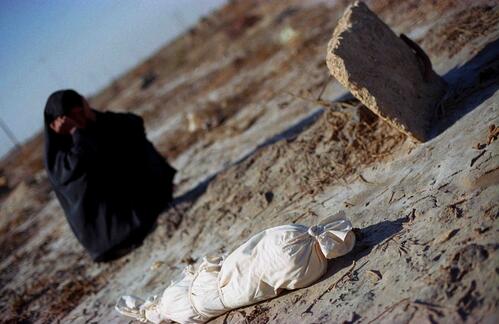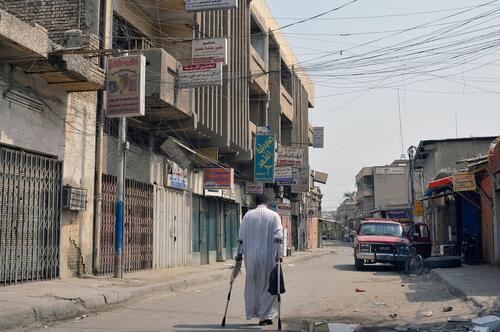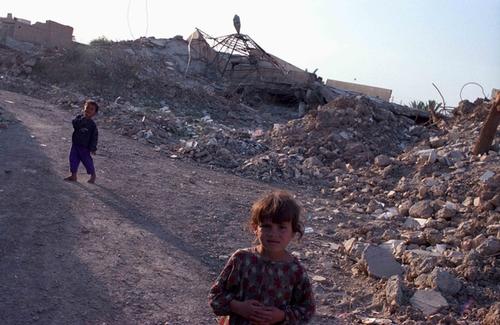Over the past two years, Médecins Sans Frontières (MSF) has helped pioneer a different approach to mental health in Iraq. A team is working with the Ministry of Health to introduce counselling.
The chief doctor in the rehabilitation ward of Fallujah’s main hospital says he prescribes fewer drugs now that psychological counselling has been introduced. Many of the patients on his ward were injured in violent incidents. One young man had his upper left arm shattered in an explosion about six months ago. The metal brace attached to the bone fragments pokes out of his arm in three different places. He looks depressed and his father says he’s anxious about his future. The patient has just been to his first counselling session and the doctor is optimistic that both his arm and his spirit will recover.
With guidance and by learning simple coping mechanisms, people can make great gains in dealing with fears and anxiety and resume normal life. Very often, medication is not required.
There is a conspicuous lack of counselling services in Iraq. Needs are huge, given the number of people suffering the effects of violence in its various forms. More than half of all counselling cases are related to violence.
One woman kept coming to the hospital complaining of lower back pain, thinking that she had some sort of tumour. The doctors could not find anything so they referred her for counselling. It turned out that during Ramadan last year her son had stepped outside to smoke a cigarette at the end of the day and had been killed in an explosion. Her physical symptoms were related to her grief.
Earlier this year, shrapnel disfigured and blinded a man in one eye. After the incident he became withdrawn, lost his confidence and felt stigmatised. He took out his frustration on his wife and son, who are now receiving counselling.
These types of accounts are common among the hundreds of people that the mental health staff counsel. The teams see an average of 300 patients and conduct more than 800 counselling sessions every month. So far, these services have been introduced in three hospitals in Baghdad and Fallujah and the aim is to replicate them in other locations, including health centres. The Ministry of Health is committed to this project and MSF has already helped train the next generation of counsellors and trainers for three locations. Telephone helplines have been set up in two areas for patients who want more information or cannot reach counsellors in person, and teams of outreach workers are promoting the services in the community.

"What are you complaints"
The positive impact of counselling is clear. Earlier this year, a grenade was lobbed into an area where a man was sitting with his family. His wife and daughter were killed and his leg was badly damaged. The man refused treatment or medication. After two weeks of counselling, he accepted treatment and could soon be discharged from hospital. Other patients include a six-year-old boy who has experienced repeated sexual abuse and a kindergarten teacher who was kidnapped and physically assaulted, but then managed to escape. Patients suffer from nightmares, fear, depression, apathy or aggression, leaving them unable to lead a normal life.
A new evaluation tool has been introduced to measure patients’ progress and improvement, and according to the data gathered by the tool, the outcomes of psychological counselling are very good. Drop-out rates vary significantly between locations, suggesting that local factors may discourage patients from returning. However, amongst those discharged, nearly all patients record an improvement in their well-being. Among a sample group of patients earlier this year, for example, 4 per cent displayed ‘light’ symptoms, 68 per cent ‘moderate’ and 28 per cent ‘severe’. Of the patients who were discharged after one month, 78 per cent had ‘light’ symptoms, 22 per cent ‘moderate’ and 0 per cent ‘severe’. For those who complete counselling, there is a very clear trend towards improved mental health.
Counselling cannot replace psychiatric medicine, but it can make a big difference to people’s lives.
In all personal accounts, places, names and time have been removed or changed to protect patient confidentiality.






